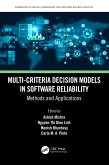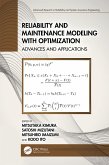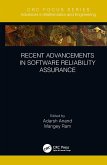Klaus Krippendorff
The Reliability of Generating Data
Klaus Krippendorff
The Reliability of Generating Data
- Gebundenes Buch
- Merkliste
- Auf die Merkliste
- Bewerten Bewerten
- Teilen
- Produkt teilen
- Produkterinnerung
- Produkterinnerung
This book expands on the authorâ s seminal work in content analysis and develops methods for assessing the reliability of the kind of data that previously defied evaluations for this purpose.
Andere Kunden interessierten sich auch für
![Multi-Criteria Decision Models in Software Reliability Multi-Criteria Decision Models in Software Reliability]() Multi-Criteria Decision Models in Software Reliability144,99 €
Multi-Criteria Decision Models in Software Reliability144,99 €![Reliability and Maintenance Modeling with Optimization Reliability and Maintenance Modeling with Optimization]() Reliability and Maintenance Modeling with Optimization175,99 €
Reliability and Maintenance Modeling with Optimization175,99 €![Reliability and Risk Analysis Reliability and Risk Analysis]() Mohammad Modarres (University of Maryland, College Park, USA)Reliability and Risk Analysis56,99 €
Mohammad Modarres (University of Maryland, College Park, USA)Reliability and Risk Analysis56,99 €![Validity and Reliability in Built Environment Research Validity and Reliability in Built Environment Research]() Validity and Reliability in Built Environment Research48,99 €
Validity and Reliability in Built Environment Research48,99 €![Modeling Remaining Useful Life Dynamics in Reliability Engineering Modeling Remaining Useful Life Dynamics in Reliability Engineering]() Pierre DersinModeling Remaining Useful Life Dynamics in Reliability Engineering97,99 €
Pierre DersinModeling Remaining Useful Life Dynamics in Reliability Engineering97,99 €![Maintenance, Replacement, and Reliability Maintenance, Replacement, and Reliability]() Andrew K. S. Jardine (University of Toronto, Ontario, Canada)Maintenance, Replacement, and Reliability133,99 €
Andrew K. S. Jardine (University of Toronto, Ontario, Canada)Maintenance, Replacement, and Reliability133,99 €![Recent Advancements in Software Reliability Assurance Recent Advancements in Software Reliability Assurance]() Recent Advancements in Software Reliability Assurance24,99 €
Recent Advancements in Software Reliability Assurance24,99 €-
-
-
This book expands on the authorâ s seminal work in content analysis and develops methods for assessing the reliability of the kind of data that previously defied evaluations for this purpose.
Produktdetails
- Produktdetails
- Verlag: Taylor & Francis Ltd
- Seitenzahl: 316
- Erscheinungstermin: 23. Dezember 2022
- Englisch
- Abmessung: 183mm x 260mm x 27mm
- Gewicht: 786g
- ISBN-13: 9780367630713
- ISBN-10: 0367630710
- Artikelnr.: 59992835
- Verlag: Taylor & Francis Ltd
- Seitenzahl: 316
- Erscheinungstermin: 23. Dezember 2022
- Englisch
- Abmessung: 183mm x 260mm x 27mm
- Gewicht: 786g
- ISBN-13: 9780367630713
- ISBN-10: 0367630710
- Artikelnr.: 59992835
Klaus Krippendorff, PhD., PhD.hc, graduate from the Ulm School of Design and the University of Illinois, Urbana, was the Gregory Bateson Professor Emeritus for Cybernetics, Language, and Culture at the Annenberg School for Communication, University of Pennsylvania. He wrote his dissertation on content analysis at a time when this method was quite underdeveloped. Content Analysis, An Introduction to its Methodology became a leading text now in its 4th Edition. The book earned the International Communication Association (ICA)'s 2004 recognition as the most influential work. The issue of reliability followed him into numerous empirical ventures. It taught him that data cannot be taken as the starting point of scientific research without knowing how they came about, what they mean, and for whom besides their analyst. In 2012, the Methodology Division of the Association for Education in Journalism and Mass Communication (AEJMC) recognized his "Agreement and Information in the Reliability of Coding" as their "Article of the Year." He wrote over a hundred frequently cited publications, not only on reliability but also On Communicating, Otherness, Meaning, and Information. In the area of design, he advocated a human interactive approach to understanding technological artifacts as well as of the design discourse that guide them: The Semantic Turn, A new Foundation for Design. In the area of Cybernetics, he received several awards for his contributions in the form of books and articles in academic journals. He wrote and taught seminars on the discursive construction of realities, not just of the social world but also of what natural scientists say they describe. He co-edited Discourses in Action; What Language Enables Us to Do . He critically explored how such constructions impact everyday life, for example, the algorithms we live with. His focus was on the possibilities of emancipation from oppression due to widely shared but burdensome realities, mistaken as unalterable facts. This frames the first chapter of the book, starting with answering the question "When are Data?" Klaus Kripendorff passed away in October 2022.
How I became interested in reliability issues. 1. On the epistemology of
reliable data. 2. Simplest kinds: The replicability of categorizing
predefined units. 3. Some properties of the Alpha. 4. Alpha compared with
primarily nominal agreement measures. 5. Metric differences between
single-valued units.6. The quadrilogy for single-valued predefined units
and big data. 7. Multi-valued coding of predefined units.8. Partitioning
continua and coding relevant segments. 9. Preserving the coherency of
identified segments in continua. 10. Distinctions drawn within continua.
11. Text mining and information retrieval. 12. Diagnostic devices and
remedial actions. 13. Some special applications. 14. Statistical
considerations. 15. Reliability standards. 16. Toward a general calculus of
differences and agreements. Appendix. References
reliable data. 2. Simplest kinds: The replicability of categorizing
predefined units. 3. Some properties of the Alpha. 4. Alpha compared with
primarily nominal agreement measures. 5. Metric differences between
single-valued units.6. The quadrilogy for single-valued predefined units
and big data. 7. Multi-valued coding of predefined units.8. Partitioning
continua and coding relevant segments. 9. Preserving the coherency of
identified segments in continua. 10. Distinctions drawn within continua.
11. Text mining and information retrieval. 12. Diagnostic devices and
remedial actions. 13. Some special applications. 14. Statistical
considerations. 15. Reliability standards. 16. Toward a general calculus of
differences and agreements. Appendix. References
How I became interested in reliability issues. 1. On the epistemology of
reliable data. 2. Simplest kinds: The replicability of categorizing
predefined units. 3. Some properties of the Alpha. 4. Alpha compared with
primarily nominal agreement measures. 5. Metric differences between
single-valued units.6. The quadrilogy for single-valued predefined units
and big data. 7. Multi-valued coding of predefined units.8. Partitioning
continua and coding relevant segments. 9. Preserving the coherency of
identified segments in continua. 10. Distinctions drawn within continua.
11. Text mining and information retrieval. 12. Diagnostic devices and
remedial actions. 13. Some special applications. 14. Statistical
considerations. 15. Reliability standards. 16. Toward a general calculus of
differences and agreements. Appendix. References
reliable data. 2. Simplest kinds: The replicability of categorizing
predefined units. 3. Some properties of the Alpha. 4. Alpha compared with
primarily nominal agreement measures. 5. Metric differences between
single-valued units.6. The quadrilogy for single-valued predefined units
and big data. 7. Multi-valued coding of predefined units.8. Partitioning
continua and coding relevant segments. 9. Preserving the coherency of
identified segments in continua. 10. Distinctions drawn within continua.
11. Text mining and information retrieval. 12. Diagnostic devices and
remedial actions. 13. Some special applications. 14. Statistical
considerations. 15. Reliability standards. 16. Toward a general calculus of
differences and agreements. Appendix. References








